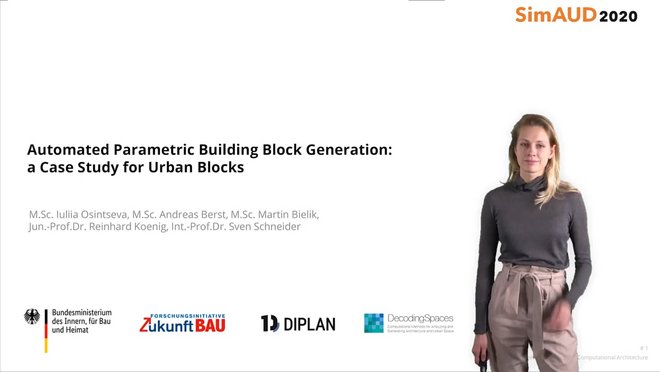
DigiWo (2018 - 2020)
Digital methods for integrated and scale independent generation, analysis and exploration of residential building variants.
The planning of a multi-family-residential building can be characterized as a multi-objective optimization problem, as multiple criteria must be considered and negotiated with each other. The output of this process - the building design - has a great impact on the social, economic, and ecological performance of the building for a long time. Therefore, it is crucial to find the optimal solution with the best trade-off between the performance criteria. The challenges that the planner faces during the planning process are (a) a large number of the design options and (b) that the fitness criteria (goals) vary from project to project and even during the work at one design. Currently, the process of the manual solution search is highly time-consuming, and hence, it is usually not possible to guarantee that the "true" optimal solution is found. The goal of this project is to develop a method for efficient automatic generation of design options for multi-family-residential buildings. The focus of the project is the cross-scale generation of designs, from the building envelopes to the detailed floorplans.
Further Information
Project documentation and downloads of the developed software components:
https://toolbox.decodingspaces.net/digiwo/
In order to enable the consideration of qualitative aspects during the generation, various ways for user interaction are introduced. Thus, the user can direct the generation into the wished direction, avoiding the creation of the variants, that do not meet the user's needs. Furthermore, after generating multiple design options, there comes the challenge of choosing the best options among them. In order to find the optimal solution, the designs must be analyzed and then compared to each other. Therefore, another stage of this project is the development of the tools for performing analysis for various criteria, such as floor area, daylight simulation, energy efficiency, visibility measurements, etc. At last, the analyzed designs can be compared with each other, using the multi-stage design exploration framework, developed during the ILCO project.
Förderung
BBSR (Zukunft Bau). Aktenzeichen: SWD—10.08.18.7-18.15
DIPLAN Gesellschaft für Digitales Planen & Bauen GmbH
Decoding Spaces GbR
Zeitrahmen:
November 2018 – Dezember 2020
Leitung:
Jun.-Prof. Dr. Reinhard König (Junior.Professur Computational Architecture)
Vertr. Prof. Dr. Sven Schneider (Informatik in der Architektur)
Projektbearbeiter:
Iuliia Osintseva
Andreas Berst


Automated parametric building block generation
Klicken Sie auf den Play-Button, um externe Inhalte von Vimeo.com zu laden und anzuzeigen.
Externe Inhalte von Vimeo.com zukünftig automatisch laden und anzeigen (Sie können diese Einstellung jederzeit über unsere »Datenschutzerklärung« ändern.)
